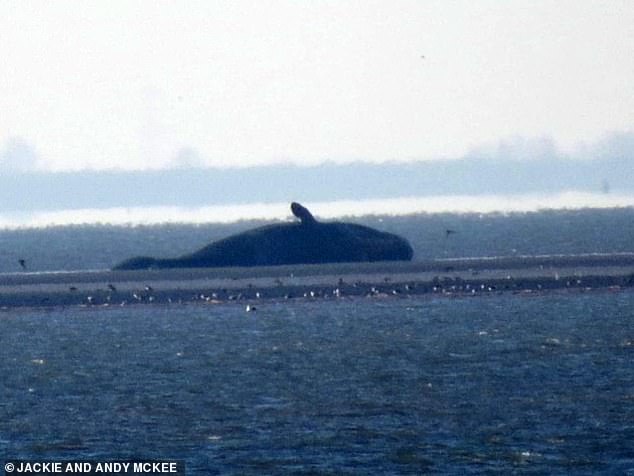Huge sperm whale washes up dead on Norfolk mudbank before tide carries its body further out to sea
- The dead sperm whale was spotted beached in The Wash on the Norfolk coast
- It was lying a mile out from Snettisham Beach but has now been carried by tide
- Locals Jacky and Andy McKee reported it to UK Cetacean Strandings Investigation Programme (CSIP)
A gigantic sperm whale has been found dead after it washed up on the Norfolk coast.
Shocked locals have turned up to see the creature after it floated on to a mudbank in The Wash where it became stuck.
Moving images show the whale lying about a mile out from Snettisham Beach a few miles from the Queen’s Sandringham estate.
However the tide has now started to carry it back further out into The Wash.
A gigantic sperm whale has been found dead after it floated on to a mudbank in The Wash off the Norfolk coast and became stuck
Local couple Jacky and Andy McKee who stumbled upon the whale have reported it to the UK Cetacean Strandings Investigation Programme, who sends scientists to carry out post mortems on stranded whales.
The whale would have been swimming in the North Sea, and it is not yet clear what killed it.
Whale strandings are a regular occurrence along Norfolk’s coastline, particularly in and around the shallow waters of The Wash which has a tidal range of around 20 feet.
Whales are stranded on UK beaches at a rate of more than five a month, according to data from 2014.

In 2016, five sperm whales washed up on the east coast of England in a matter of days.
Three carcasses were spotted off the coast of Skegness over the course of a weekend, followed one in Hunstanton, Norfolk, and one off Wainfleet, Lincolnshire, days later.
As the animals can pose a public health risk, local councils must close off the beach while they dispose of the body or allow it to rota naturally.
East Lindsey District Council has previously estimated that each beached sperm whale costs about £10,000 to dispose of.
